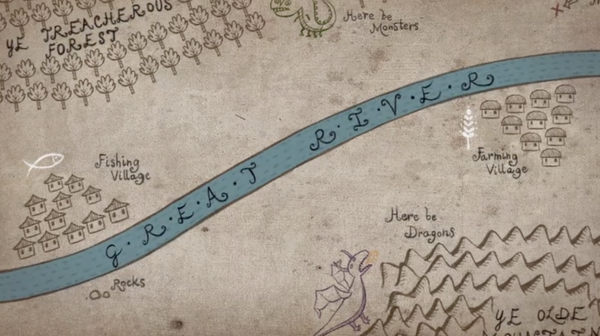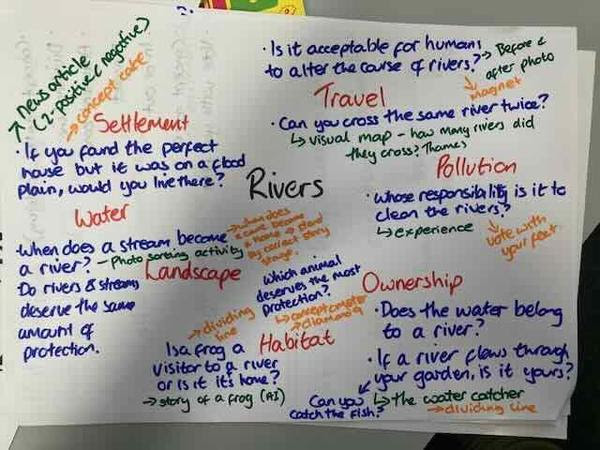This week, three questions on rivers – two new, and one old. This bulletin was inspired by a Curriculum Clinic I ran at South Hampstead High Junior School last week (see below).
For all students: Is it acceptable to alter the course of a river?
Edit the editables in the stimulus below and present to your class.
Dear students,
We have been asked to consult the public on a new proposal to alter the course of the (insert river near to you). Some believe there is a need to alter the course of this river because (insert one of the reasons below – either one that fits your location, or that you think will produce the juiciest discussion)..
- to make way for a new shopping centre
- to allow for more local housing to be built
- to improve the irrigation for local farmers
- to create hydroelectric energy
- to support more people to access it through the local park
Any re-routing of the river will be done with minimal impact to local wildlife. Any birds or mammals who have made their home in the riverbanks will be relocated before work begins, but obviously we cannot be sensitive to every insect. Some have already suggested the course that nature has chosen for the river should be respected, but altering the river would bring numerous benefits to people and the local community
Please discuss as a group and let us know your thoughts and conclusions.
Best wishes,
The Local Council
There are plenty of philosophical concepts at play here, such as modernity, benefit, respect, preservation, interference and nature. After the first discussion has run its own course, you might want to swap out the reason for the letter and ask “Would it make a difference if the reason was…” and choose another from the list, or one of your own.
For older students: Should a river be a person?
Here’s a stimulus you could use for older children, bringing in the topical question of whether the River Clyde in Scotland should become a “legal person”.
Not every person you come across is a living, breathing human being. That might sound a bit scary, but I’m not talking about zombies or vampires. You’ve probably bought things from lots of persons who aren’t human. Right now, you’re sitting in a chair that belongs to a person who wasn’t born, won’t die, and doesn’t need to eat, sleep or breathe. But who? Or rather what?
The answer is that there are a few million “legal persons” that aren’t actually human people, but that the law often treats as if they are. Companies, businesses, schools, academy trusts that run groups of schools, charities, clubs, universities, hospitals – all of these can be “legal persons”. It means they can own stuff, borrow and lend money, buy property, pay taxes, be taken to court if they do something wrong, or take someone else to court if their rights aren’t respected.
In New Zealand, there are some rivers that are “persons” and in Scotland thousands of people have signed a petition for the River Clyde to be made into a person. The idea is that that would make it harder for people to pollute the river or spoil sections of it by taking out too much water. Perhaps the river could end up owning its banks, or its water, in the same way that a company might own its offices. Of course, the river would still need human people to look after it, but if it was a “person” it might be easier for campaigners to protect it. If your local McDonalds can be a person, or the school you’re sitting in, why can’t a river?
If a river flows through your land, can you do as you wish with the water?
Jason’s story “The Water Catcher” was turned into an animated short by the BBC (confusingly titled “Who Owns the Sky?”). It tells the tale of a community of fisher-folk whose livelihood depends on a river that dries up. It explores the concept of ownership of natural resources and whether they can be shared or even stolen, encouraging children to consider if and how resources like water can be owned and what happens when one community benefits from it at the expense of another.

And a few more…
Here’s the plan we made with teachers on Thursday. These low-cost days are a great way to help teachers understand what makes a great philosophical/oracy question, and how to spot new ones as they arise live – a crucial understanding that ChatGPT just can’t provide. If this sounds like something your school curriculum would benefit from, learn more here and get in touch today.

Your Free Oracy Consultation Call
Afterr some great conversations last week, we’re still offering free Oracy Consultation calls – where we listen to your goals and crucially your “pain points”, so we can give you practical strategies you can use immediately. It doesn’t matter if you’re a teacher, middle-leader or member of SLT – you just need to be in a school. No catch, or obligation to book anything. Just free advice. You can book yours now via our Calendly link below.
What’s on in the Philosoverse?
Following the Future of Education Show in Manchester, Tom was in two London schools last week, delivering a parent workshop and Curriculum Clinics in one, and a teambuilding and leadership day in the other. He’s now working on our next minibook – this time for students – based around the Thinking Moves A-Z framework.
Jason was at three schools in a day in Norfolk on Friday, showcasing oracy strategies to different year groups. He’s been back on Zoom this week delivering classes on P4HE.org and running a study skills session for sixth formers through Trinity College Oxford.
Your next free P4C webinar
During British Philosophy Fortnight, our colleagues at SAPERE are holding a free webinar to support you do more philosophy. It’s on Wednesday March 26th from 6pm-7pm, and will familiarise you with resources released as part of British Philosophy Fortnight that use ideas that matter and connect to young people such as toys, pets, clothes and video games as a route into philosophical thinking.
Your host for this session will be Emma Leeson SAPERE’s Training and Resources Lead and a SAPERE Trainer. These webinars are useful to both new P4Cers and to old hands, especially those who have other colleagues to support.
Best wishes,
Tom and Jason